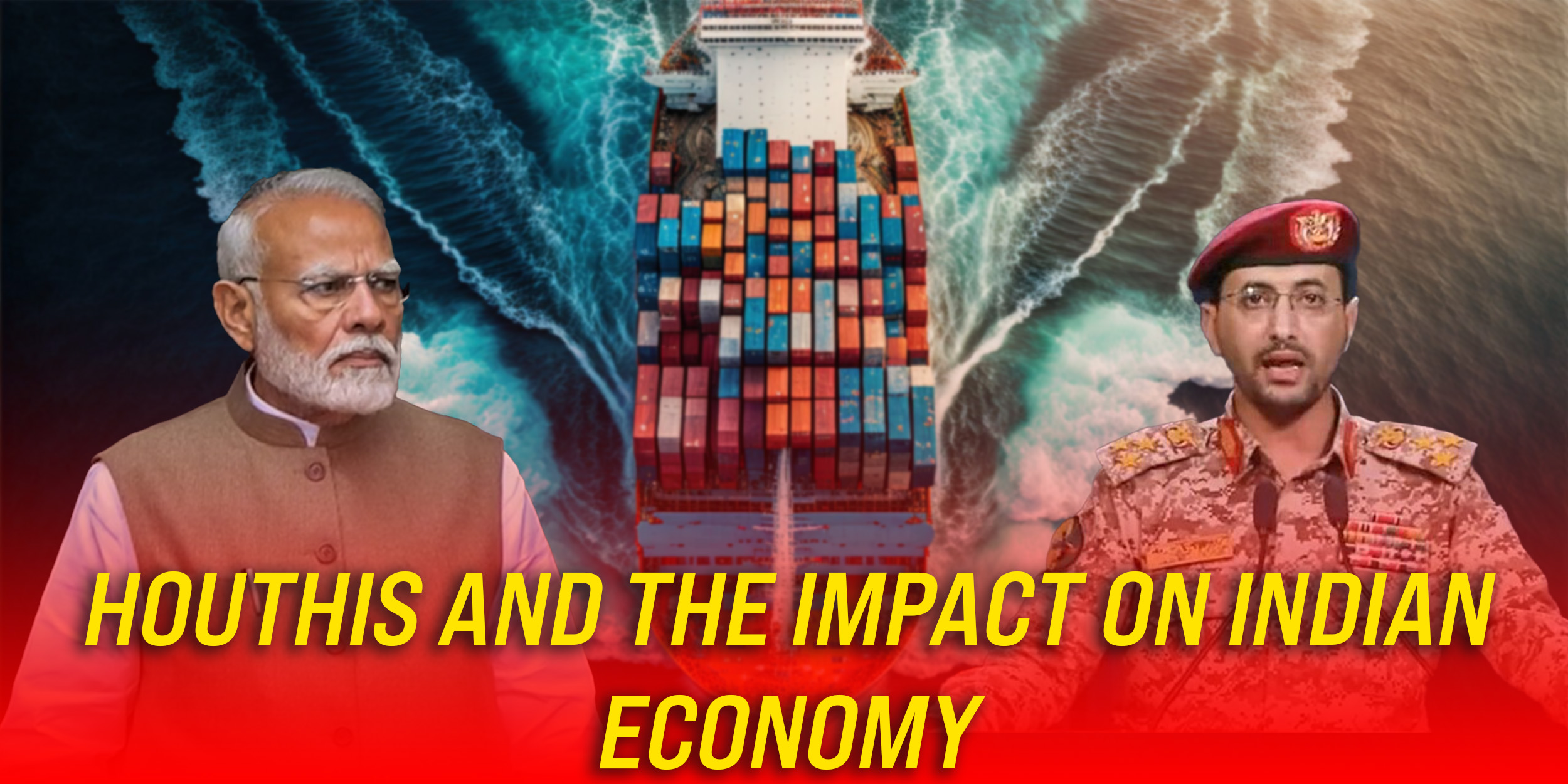Houthis and the impact on Indian Economy

Ansar Allah, better known as the Houthis (that has resulted from their conduct) are an exclusively Zaidi Shia Muslim sect hailing from Yemen. The movement dates back to the 1990s and began with a demand for cultural and religious rights by northern Zaidis, who felt marginalized following Yemeni unification under longtime president Ali Abdullah Saleh.
Historical Context
The Houthis movement had its origins in the early 1990s, when Hussein Badreddin al-Houthi a prominent Zaidi cleric took up arms to resist what he saw as efforts by Yemen’s government and Saudi-backed Salafi jihadists to marginalise Shias. He called for both political and cultural reform, as well as social justice among the Zaidi population; calling upon his followers to a campaign he termed the Believing Youth.
Hussein al-Houthi was killed by Yemeni government forces in 2004, precipitating the Houthis War. After Hussein was killed, the movement was led by his brother Abdul-Malik al-Houthi who moved on confront government’s repression and gaining widespread influence.
The Yemeni Civil War
During the Arab Spring in 2011, anti-government protests against President Ali Abdullah Saleh gave rise to the Houthis. Taking advantage of the chaos, the Houthis took control of Sana’a in September 2014 and Saleh was essentially forced to stand down. Their slogan “Death to America, Death to Israel,” underscored their anti-Western and anti-Israel attitudes.
The fighting intensified in 2015 when the conflict expanded as a Saudi-led Muslim coalition sided with Yemen’s internationally recognised government and since has caused one of the world’s worst humanitarian crises. Key among these actors were the Houthis, a group that secured power in northern Yemen and ultimately seized Sana’a, making them both an object of regional powers competition – particularly between Saudi Arabia and Iran (which is accused of aiding the rebels).
In the Yemeni civil war, the activities of Houthis are relevant for Indian economy and implications in following sectors.
- Energy Security
India is a big energy importer, with much of its imported oil hailing from the Middle East. Although Yemen is not a significant oil exporter to India, it overlooks important maritime routes including the Bab el-Mandeb Strait linking the Red Sea and Gulf of Aden.
The Houthis have taken control over some southern provinces in Yemen, including Aden next to the Gulf of Adan and close shipping routes. Those types of interruptions, such as the periodic attacks by Houthi forces directed at commercial vessels passing through those channels are a recipe for higher shipping expenses and insurance rates plus potential crude oil shortfalls. These disruptions may also lead to volatility in global crude prices and ultimately affect our import bills and inflation figures.
- Trade Relations
Historically, Yemen was also a significant trading partner for India’s food and agriculture recurring business. The trade has taken a severe hit due to the interventionist conflict affecting exports and imports from India. Yemen: The unrest in Yemen has caused the Indian businesses challenging to tread and trade with their partners from there resulting in fall of bilateral trading relations.
The humanitarian crisis in Yemen, meanwhile, has shifted the focus and resources of international community with potential long-term impact on investment opportunities within region due to these inter-state ties.
- Indian Diaspora & Remittances
Many Indians live in Yemen and the Gulf. The conflict has been an ongoing ordeal leading to the evacuation of Indian nationals from Yemen, especially during moments of high tension.
Such repatriation may also have dual implications: a) ensconce the safety of Indian citizens and b) significantly impede remittance flows. Moreover, remittances are a lifeline for many families in India whose business had come to standstill due to the ongoing pandemic. For one thing, the local economy can suffer if remittances are down significantly — especially in many states that so heavily rely on this revenue.
Brief Background: The Palestine-Israel Conflict
The Israel-Palestine conflict remains one of the most notorious and protracted feud in contemporary times. Growing out of competing nationalisms and historical grievances, the conflict has been waged through several phases since the early 20th century.
Historical Background
The conflict is rooted in the late 19th and early 20th centuries, with the birth of major nationalist movements among Jews and among Arabs, both geared towards attaining sovereign statehood for their people in the Land. The influx of Jewish immigrants into Palestine, motivated by the vision for a “national homeland,” intensified following Perlsecution in Europe.
This led, in a predictable fashion to the Balfour Declaration of 1917 — where British government formally supported creation of “national home for Jewish people” within Palestine border. After World War I and the dissolution of the Ottoman Empire, Britain occupied Palestine; in 1920 land that was to become Trans-Jordan then Jordan together with what is now Israel along what could be called its borders today. Jewish immigrants embarked for Jerusalem under Turkish guard-hadjis-arabs stream into Northern areas where Palestinians use Israeli med facilities as their own-go figure!
The violence reached a new level in 1947, when the United Nations put forth an idea for dividing Palestine into two separate Jewish and Arab states. The plan was accepted by the Jewish leaders but rejected by Arab leaders and soon violence erupted. The creation of the State of Israel in 1948 was followed by the first Israeli-Arab war which led to massive expulsions and refugees into large refugee’s populations.
Key Events
Throughout the intervening years, the conflict has seen a lot of different wars, uprisings (Intifadas), and peace initiatives but no sustainable solution has been found for it. Key events include:
The Six-Day War (1967): Israel’s win meant it held the West Bank, Gaza Strip and East Jerusalem — lands Palestinians dream of for a state.
Oslo Accords (1993): The first deal ever on how to make peace established the Palestinian Authority and tried to establish a path of resolution. But violence in the aftermath and subsequent political developments have stifled progress.
War of the Camps — 2000–05: Although many Palestinians claim this as the second intifada, it was a period where Palestinian refugess began attacks against Lebanons refugee camp settlements when they suspected Al-Qaeda members were planning to kidnap other residents for ransom ware.
Recents escalation: The conflict has since remained bloody, particularly in Gaza City where Israel is at war with fighters of the Islamist movement Hamas and other armed Palestinian organizations.
Here is a brief analysis of the effects of the Palestine-Israel conflict on India’s economy
The war between Palestine and Israel, although far distant at space from India, has various consequences on the Indian economy.
- Geopolitical Relations
Over the years, India has consistently adopted a balanced stand with regard to Palestine and Israel harboring sympathy towards Palestinians but at the same time building robust relationswith Tel Aviv including in defence and technology. That balanced approach is also necessary for India’s strategic interest in the Middle East.
At the same time, any flare-up in that conflict could spark regional instability and threaten trade routes and security more widely across the Middle East. Tensions between the two countries could disrupt oil supplies from the region and, by extension, can impact prices also given India’s monthly oil import bill.
- Energy Prices
The Palestine-Israel conflict can influence the global oil markets as well in a similar respect to Houthi. It does so because instability in the Middle East can affect world oil prices and they, of course affects Indias vast economy. Higher oil prices could aggravate India’s trade balances and pose upside risks to inflation. - Defense and Security
A cornerstone of bilateral relations has been India’s expanding defense ties with Israel. But any matters adversely affecting security matter in the area could force India to think — and spend on its defense strategy. And as we spend more on defense that diverted money can be spent for other priorities, such as needed social programs and development projects.
Economy and Diplomatic Relations
And it depends on where India takes position with reference to Palestine. But India must also tread carefully as it deepens ties with Israel, since many of its relations in the Arab world are based on mutual support for Palestinian aspirations. How to keep the trade relations and energy security canorized is a delicate balancing act?
Conclusion
The Houthis and the Palestine-Israel conflict are different, but both have consequences that affect India economically. The unrest in the Middle East and elsewhere affects energy supplies, trade relationships as well as other geopolitical variables that impact on India’s economic wellbeing, not to mention threat elements.
While India is at it, she has to pursue a multiple-pronged strategy that not only upholds her national interests but also works towards lasting peace and stability in the region. The challenges from these theatres show us how diplomacy, strategic partnerships, and a deep understanding of regional geopolitics will determine both India’s economic future.
If you liked this Article, you may also wants to check out other blogs.






